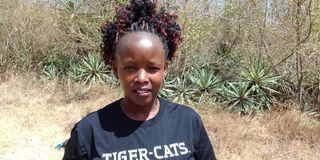How my child got brain damage after a fall

Gladys Kinyua whose child suffered brain damage when she fell at 9 months old.
Parents of children with neurodiversity conditions tend to endure cultural and social stigma.
Neurodiversity conditions include autism spectrum, Cerebral Palsy (CP), down syndrome, Attention Deficit Hyperactivity Disorder (ADHD), learning disorders and epilepsy.
Ms Gladys Kinyua knows too well the emotional exhaustion that comes with caring for a child with Cerebral Palsy.
Ms Gladys says her daughter, then 9 months old, developed brain damage when she fell at home while alone with the house help.
She says she noticed her child's health suddenly start to deteriorate.
It was after numerous trips to the doctors that Gladys was informed her child had traumatic brain injury.
“The nanny opened up to me one year later that the baby had fallen but it was too late to undo the damage that had been done on her brain,” Gladys recalls.
She continues, “Such a child needs special care unlike other children. I believe my child would have been saved if the house girl would have reported to me early.”
Although she has forgiven the nanny, Gladys notes that it was not easy to let it go.
"The relationship that a parent has with the nanny is crucial in the growth and development of the child," she adds.
Ms Margaret Wambui Warui, whose child suffers from cerebral palsy says the baby was born with the condition.
She admits that at first it was not easy handling the little one owing to the condition that the child is in, that calls for more attention including feeding and keeping a close watch.
Wambui advises parents of children with neurodiversity conditions to always embrace and accept the child early as this helps them to grow and do away with the stigma.
“The journey has not been easy, but when you embrace the child early, it becomes easier to bring them up,” she said.
The script is the same for Ms Edna Nyamanya who admits that it took some time for her to accept her child.
For her, life was tough after giving birth to her child in 2019, October especially after the father’s child abandoned her.
“The father of my child told me he was not interested in the child anymore,” she says.
She is also quick to add that the society is yet to embrace such children.
